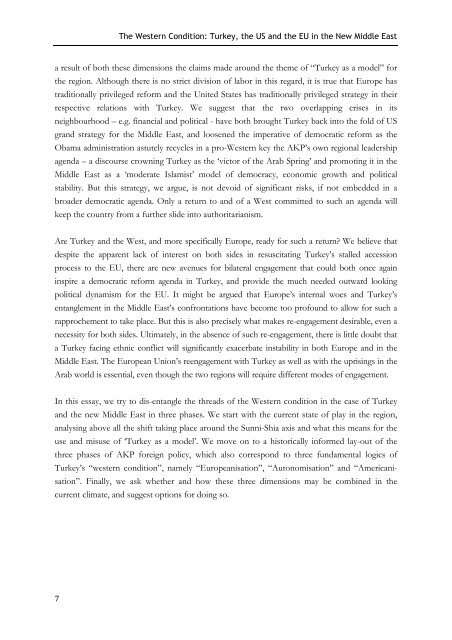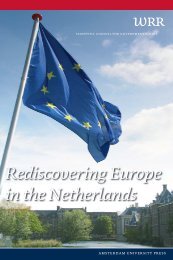The Western Condition - St Antony's College - University of Oxford
The Western Condition - St Antony's College - University of Oxford
The Western Condition - St Antony's College - University of Oxford
Create successful ePaper yourself
Turn your PDF publications into a flip-book with our unique Google optimized e-Paper software.
<strong>The</strong> <strong>Western</strong> <strong>Condition</strong>: Turkey, the US and the EU in the New Middle East<br />
a result <strong>of</strong> both these dimensions the claims made around the theme <strong>of</strong> “Turkey as a model” for<br />
the region. Although there is no strict division <strong>of</strong> labor in this regard, it is true that Europe has<br />
traditionally privileged reform and the United <strong>St</strong>ates has traditionally privileged strategy in their<br />
respective relations with Turkey. We suggest that the two overlapping crises in its<br />
neighbourhood – e.g. financial and political - have both brought Turkey back into the fold <strong>of</strong> US<br />
grand strategy for the Middle East, and loosened the imperative <strong>of</strong> democratic reform as the<br />
Obama administration astutely recycles in a pro-<strong>Western</strong> key the AKP’s own regional leadership<br />
agenda – a discourse crowning Turkey as the ‘victor <strong>of</strong> the Arab Spring’ and promoting it in the<br />
Middle East as a ‘moderate Islamist’ model <strong>of</strong> democracy, economic growth and political<br />
stability. But this strategy, we argue, is not devoid <strong>of</strong> significant risks, if not embedded in a<br />
broader democratic agenda. Only a return to and <strong>of</strong> a West committed to such an agenda will<br />
keep the country from a further slide into authoritarianism.<br />
Are Turkey and the West, and more specifically Europe, ready for such a return? We believe that<br />
despite the apparent lack <strong>of</strong> interest on both sides in resuscitating Turkey’s stalled accession<br />
process to the EU, there are new avenues for bilateral engagement that could both once again<br />
inspire a democratic reform agenda in Turkey, and provide the much needed outward looking<br />
political dynamism for the EU. It might be argued that Europe’s internal woes and Turkey’s<br />
entanglement in the Middle East’s confrontations have become too pr<strong>of</strong>ound to allow for such a<br />
rapprochement to take place. But this is also precisely what makes re-engagement desirable, even a<br />
necessity for both sides. Ultimately, in the absence <strong>of</strong> such re-engagement, there is little doubt that<br />
a Turkey facing ethnic conflict will significantly exacerbate instability in both Europe and in the<br />
Middle East. <strong>The</strong> European Union’s reengagement with Turkey as well as with the uprisings in the<br />
Arab world is essential, even though the two regions will require different modes <strong>of</strong> engagement.<br />
In this essay, we try to dis-entangle the threads <strong>of</strong> the <strong>Western</strong> condition in the case <strong>of</strong> Turkey<br />
and the new Middle East in three phases. We start with the current state <strong>of</strong> play in the region,<br />
analysing above all the shift taking place around the Sunni-Shia axis and what this means for the<br />
use and misuse <strong>of</strong> ‘Turkey as a model’. We move on to a historically informed lay-out <strong>of</strong> the<br />
three phases <strong>of</strong> AKP foreign policy, which also correspond to three fundamental logics <strong>of</strong><br />
Turkey’s “western condition”, namely “Europeanisation”, “Autonomisation” and “Americanisation”.<br />
Finally, we ask whether and how these three dimensions may be combined in the<br />
current climate, and suggest options for doing so.<br />
7

















